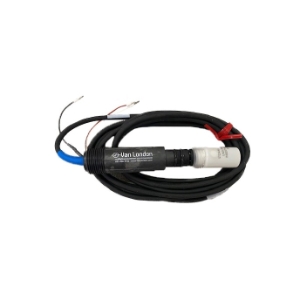Analytical Tools - Van London
At Centro, we carry a complete selection of analytical tools for purchase online. This includes everything from analytical probes and transmitters to conductivity...
pH probes, also known as pH sensors or electrodes, are essential tools in analytical chemistry and various industrial processes for measuring the acidity or alkalinity of a solution. These probes operate based on the principle of detecting hydrogen ion concentration in a given medium. Typically composed of a glass electrode and a reference electrode, pH probes generate a voltage signal proportional to the pH of the solution being measured. The glass electrode, sensitive to hydrogen ions, facilitates the conversion of chemical information into an electrical signal. Accurate pH measurements are crucial in diverse applications, ranging from scientific research and environmental monitoring to quality control in food and beverage production. pH probes find utility in laboratories, water treatment plants, pharmaceutical manufacturing, and many other industries where precise control of acidity or alkalinity is imperative for maintaining optimal conditions and ensuring the quality of end products. Regular calibration and maintenance are essential to uphold the accuracy and reliability of pH probes in various settings.
Instrumentation refers to devices that measure or control physical variables such as temperature, level, flow, or pressure. These products are essential in the industry because they allow for maximum output with minimum use of raw materials. Flow instruments include flow meters, positive displacement meters, rotameters, flow switches, oval gear meters, and calibration equipment. Analytical instruments measure temperature, pH, conductivity, dissolved oxygen, turbidity, humidity, chlorine, gases, trace oxygen resistivity, and carbon. Pressure instruments include pressure gauges, pressure switches, pressure transmitters, differential pressure gauges, cryogenic gauges, O.E.M. gauges, submersible gauges, digital pressure gauges, and calibration equipment. Level instruments, such as ultrasonic sensors, magnetic float sensors, capacitance sensors, submersible pressure sensors, differential pressure sensors, float valve sensors, float switches, electro-optic sensors, and radar sensors, are used to measure the level of a substance in a container or vessel.
Conductivity probes measure the electrical conductivity of liquids. These probes typically consist of electrodes that immerse into the liquid to assess its ability to conduct electricity, which correlates with ion concentration and purity. Conductivity probes provide real-time data for providing optimal conditions and compliance with industry standards. Browse our selection below or contact us to speak with a product expert.
Conductivity transmitters measure and transmit electrical conductivity levels in liquids. These transmitters convert conductivity measurements into standardized electrical signals (such as 4-20 mA) for monitoring and control systems. Conductivity transmitters provide real-time data to optimize processes and ensure compliance with regulatory standards. Browse our selection below or contact us to speak with a product expert.
pH transmitters play a crucial role in the field of analytical instrumentation by converting electrical signals from pH probes into usable data for monitoring and control systems. These devices enhance the functionality of pH measurement tools, such as pH electrodes or probes, by amplifying and transmitting the signals they generate. pH transmitters are essential in industrial processes where maintaining a specific pH level is critical for product quality or process efficiency. These transmitters not only provide accurate and continuous pH readings but also offer additional features such as data logging, remote access, and integration with control systems. This allows for real-time monitoring and adjustments to ensure optimal conditions. pH transmitters find applications in diverse industries, including chemical manufacturing, water treatment, and food production, contributing to improved process control and overall operational efficiency. Regular calibration and maintenance are essential to uphold the accuracy and reliability of pH transmitters, ensuring their effectiveness in various analytical and industrial settings.
Conductivity analytical tools play a pivotal role in measuring the ability of a solution to conduct electric current, providing valuable insights into the concentration of dissolved ions. These tools are widely used in various scientific, industrial, and environmental applications to assess the purity and composition of liquids. The principle underlying conductivity measurements involves the detection of ions, which enhance electrical conductivity in a solution. The greater the concentration of ions, the higher the conductivity. Commonly employed in water quality testing, pharmaceutical manufacturing, and chemical process control, conductivity analytical tools assist in monitoring the effectiveness of water treatment processes, ensuring compliance with regulatory standards, and maintaining the integrity of industrial processes. The versatility of conductivity measurements extends to applications such as detecting contaminants, assessing the salinity of water bodies, and optimizing the efficiency of chemical reactions. Regular calibration and maintenance are essential to ensure the accuracy and reliability of conductivity analytical tools, contributing to their indispensable role in analytical chemistry and industrial quality control.
$228.94
Subject to factory lead times
$539.81
Subject to factory lead times
$552.90
Subject to factory lead times
$508.52
$446.97
Subject to factory lead times
$542.12
Subject to factory lead times
$601.83
$597.47
$588.78
$573.70
$599.02
Subject to factory lead times
$459.38
$228.94
Subject to factory lead times
$539.81
Subject to factory lead times
$552.90
Subject to factory lead times
$508.52
$446.97
Subject to factory lead times
$542.12
Subject to factory lead times
$601.83
$597.47
$588.78
$573.70
$599.02
Subject to factory lead times















